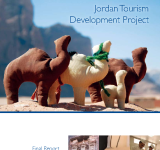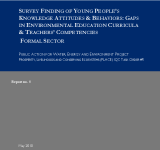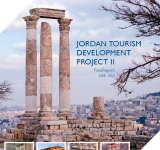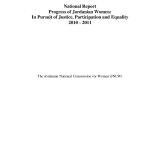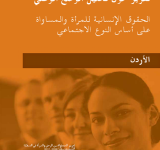The final report is the product of the Jordan Tourism Development Project;; which is a three-year project that operated from August 2005 to August 2008. The Project worked closely with government stakeholders;; particularly the Ministry of Tourism and Antiquities and Department of Antiquities;; along with the private sector;; local communities and the tourism industry to help develop Jordan's tourism industry. As part of the project;; the USAID/Jordan's primary aim was to develop Jordan's key tourism institutions and improve the institutional environment to better facilitate tourism development. The project also worked to change perceptions of the industry through a nationwide campaign that entailed workshops;; training sessions and delivering key messages by distributing brochures;; flyers and posters. According to the report;; the work of the USAID/ Jordan Tourism Development Project has created strong momentum among the government and private sectors;; as well as communities;; for positive development of tourism in Jordan;; leaving much scope for further development of the country's tourism sector to bring Jordan closer to operating a full-fledged tourism industry that attracts increasing numbers of tourists and effectively meets their growing demands. The report also finds several areas that still need improvement such as the awareness of the importance of tourism to Jordan;; marketing and recruitment for tourism institutions and standards of tourism accommodation.
private
The report aims to learn about young people's knowledge;; attitudes;; and behaviors with regards to water conservation;; energy conservation;; and waste management;; and it assess these against the learning objectives of the curriculum. It discovers that students' knowledge was sufficient and at times more sophisticated than that founded in the curriculum even though their attitudes and behaviors remain largely unchanged. The object of the survey pertains to the objectives of the Public Action for Water;; Energy;; and Environment Project;; which revolve around education for young people;; teachers and youth leaders to develop their knowledge and ethical values and attitudes. The survey focuses on assessing young people and educator's current awareness of water and energy resources and waste reduction and evaluating formal curriculum resources. The report points at the gap of translating young people's knowledge into genuine interest;; concern and action and proposes set of targeted actions including development of relevant resources and additional supplemental materials;; age-relevant projects to support environmental concepts in the national curriculum and assignment of environmental coordinator at all schools.
The USAID Jordan Tourism Development Project is the largest dedicated tourism development project implemented by the United States Agency for International Development. The final report for the project phase of 2008-2013 shares success stories of developing Jordan's tourism sector and increasing the number of visitors to the country according to the updated national strategy for the current period with new targets and implementation of actions. The report highlights the projects' achievements in supporting archaeological conservation of key sites such as Petra;; Madaba and Amman Citadel and improving the visitor experience in Jordan through an extenstive nationwide training program. The final report also includes the stories of those who benefitted from USAID's investment in tourism and the USAID tourism project's comprehensive sustainable tourism industry development approach.
This national report is designed to trace the progress of women in various fields;; monitoring achievements;; and highlighting gaps and failures;; as well as analyzing indicators;; recommending measures;; and measuring levels of achievements in the implementation of plans and strategies. The main themes were selected according to national priorities dictated by each stage: Legal Protection for Women's Right to Access Justice;; Participation;; the Economic Empowerment of Jordanian Women;; Equality;; Citizenship and Decision-Making in Public Life. The conclusions of this report confirm that a much smaller effort was exerted at the level of providing information;; data and the provision of services in the area of providing justice and facilitating ways of achieving it. The lack of knowledge about available services among women;; whether provided by civil society organizations or government institutions;; affects women's ability to access justice negatively. Regarding the economic participation the Policies and plans that targeted empowering women economically show that the result of these policies was weak and limited. Difficulty of women’s access to job opportunities in the private sector and inequitable pay between the sexes;; lack of supporting services to working women;; including childcare Facilities;; poor matching between education outputs and skills required in the labor market and the traditional social standards that contribute to directing females towards certain professions. The report proposed general recommendations and directions that include quick solutions to deal with the main highlighted challenges.
وﻳﻜﻤﻦ اﻟهدف اﻟﻌﺎم ﻣﻦ اﻟﺘﻘﺮﻳﺮ اﻟﻮﻃﻨﻲ ﻓﻲ اﻟﻘﻴﺎم ﺑﺘﺤﻠﻴﻞ وﺿﻊ ﺣﻘﻮق اﻟﻤﺮأة واﻟﻤﺴﺎواة ﻋﻠﻰ أﺳﺎس اﻟﻨﻮع ﺑﺎﻟﺘﺮﻛﻴﺰ ﻋﻠﻰ اﻹﺻﻼﺣﺎت اﻟﻘﺎﻧﻮﻧﻴﺔ واﻟﻤﺸﺎرﻛﺔ ﻓﻲ ﺻﻨﻊ اﻟﻘﺮار ﻓﻲ اﻟﻤﺠﺎﻟﻴﻦ اﻟﻌﺎم واﻟﺨﺎص واﻟﻌﻨﻒ اﻟﻤﺮﺗﻜﺐ ﻋﻠﻰ أﺳﺎس
